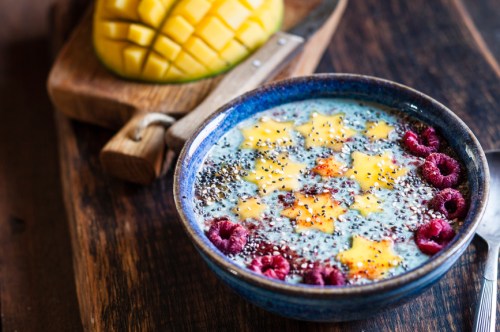Just like 1 + 1 = 2, eating foods rich in calcium + your body = greater likelihood of maintaining healthy bones as you age. But if the first thing that comes to mind when the topic of calcium comes up is a big ol’ glass of milk, we want to emphasize that although dairy products are among the top calcium-rich foods, they’re just one piece of the proverbial pie. In fact, there are plenty of other bone health-boosting foods packed with the mineral, including plant-based and vegan calcium sources.
Experts in This Article
registered dietitian and prenatal and postnatal health expert
Ahead, we delve into some of the best vegan calcium sources that have just as much of the nutrient as a glass of milk. (Got kale? Soy milk? Chia seeds?) Additionally, a registered dietitian delves into why it’s important to keep our calcium levels up in the first place, and how those needs change as we age.
Health benefits of calcium at any age
It’s no secret that consuming sufficient amounts of calcium has several benefits. For starters, it’s one of the three main nutrients responsible for maintaining bone health (along with vitamin D and magnesium), which is vastly important considering that bone density begins to decrease after the age of 35. And that’s just scratching the surface: Calcium needs continue to change as we age and become even more imperative after 50 for women and 70 for men.
It’s also worth noting that nearly 99 percent of calcium is stored in our bones. And according to Lauren Manaker, MS, RDN, LD, CLEC, CPT, a registered dietitian based in Charleston, if our calcium intake is low, our bones may “give up” some of the calcium that’s stored in there to support other bodily functions, since calcium is also an essential mineral and electrolyte for regulating nerve functioning, muscle contractions, blood clotting, and cardiac function, to name a few. All to say: Finding ways to up your calcium intake is a smart idea for overall functioning…but especially when it comes to maintaining bone health as you age.
4 vegan calcium sources recommended by a registered dietitian
Dairy milk is one of the best sources of calcium, with over 300 milligrams of the mineral per one-cup serving, but Manaker says it’s far from being the only one. “There are other sources of calcium that provide just as much calcium as this quintessential bone health-supporting food,” she says. Ahead, she delves into four of the best vegan calcium sources to incorporate into your diet as you meet your daily quota. (Which Manaker says is roughly 1,000 milligrams daily for most adults, although older folks might need slightly more than that.)
1. Soy milk
ICYMI, soy milk is the best plant-based milk, according to a gastroenterologist, for supporting gut (and overall) health. That’s because it contains the same amount of protein and essential amino acids as cow’s milk. Yet, soy milk has a leg up on cow’s milk when it comes to its anti-inflammatory agent known as isoflavones, which is linked to reducing the risk of heart disease and stroke, lowering blood pressure, and improving bone health. Another major selling point of consuming soy milk is—you guessed it—calcium. One cup of soy milk also contains 300 milligrams of calcium (the same as a cup of cow’s milk).
2. Edamame
Indeed, soy milk is derived from soybeans (and edamame are young soybeans harvested before they harden or ripen). Edamame also contains a substantial amount of calcium, nearly 100 milligrams per cup of non-shelled beans, to be exact. Additionally, tofu, another soy-derived product, contains a whopping 434 milligrams of calcium in only a half-cup serving.
3. Chia Seeds
Chia seeds are best known as small but mighty seeds packed with protein, fiber, healthy fats, and phytonutrients that fight inflammation. What’s lesser known is that they’re also loaded with tons of calcium. In fact, chia seeds contain 631 milligrams of calcium per 100-gram serving (about 10 tablespoons); a two-tablespoon serving size of chia seeds contains about four grams of protein, 11 grams of fiber, and 18 percent of your recommended daily amount of calcium. That said, chugging chia in water all day (h/t TikTok) isn’t advisable. Too much can leave you feeling severely backed up for days or lead to other, more serious digestive issues.
4. Kale
Eat your veggies, they say—and when it comes to kale, they’re not wrong. One cup of cooked kale contains 177 milligrams of calcium, nearly five grams of fiber, and more than three grams of protein. Double that serving, and you’ve got yourself plenty more calcium than a cup of milk. Plus, this leafy green contains carotenoids, antioxidants (like lutein for eye health), vitamin E, and vitamin K, to name a few. Kale, yeah.
An RD spills the beans about soy:
Sign Up for Our Daily Newsletter
Get all the latest in wellness, trends, food, fitness, beauty, and more delivered right to your inbox.
Got it, you've been added to our email list.










